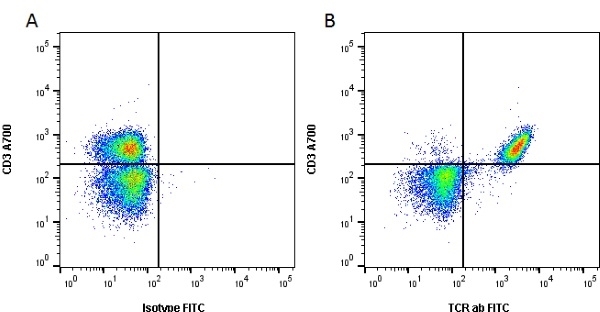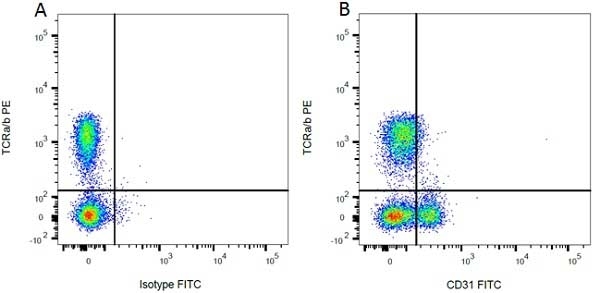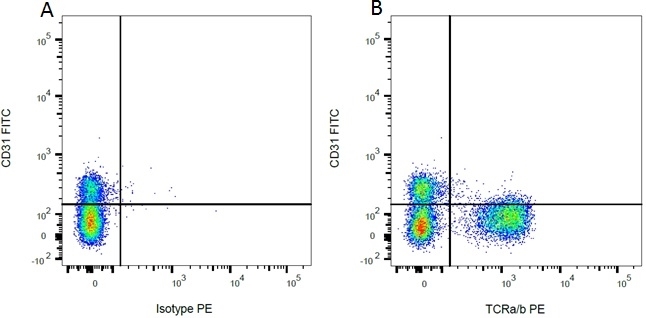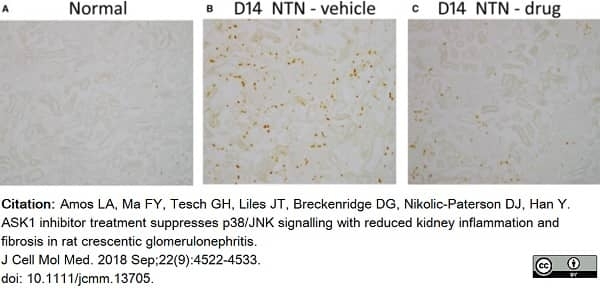TCR Alpha/Beta antibody | R73




Mouse anti Rat TCR alpha/beta:FITC
- Product Type
- Monoclonal Antibody
- Clone
- R73
- Isotype
- IgG1
- Specificity
- TCR Alpha/Beta
| Mouse anti Rat TCR alpha/beta antibody, clone R73 recognizes a constant determinant on the beta chain of the rat alpha/beta T cell receptor, expressed by 97% of peripheral rat T cells as defined by the OX-52 marker. R73 is mitogenic for unseparated spleen cells and for purified T cells. In the rat thymus, mature medullary cells express the R73 determinant at the same levels as peripheral T cells, whereas 94% of CD4 - CD8 - thymocytes are R73 negative. Mouse anti Rat TCR alpha/beta antibody, clone R73 is reported to stimulate adhesion between Thymic Dendritic Cells and Thymocytes (Colic et al. 2010). |
- Target Species
- Rat
- Species Cross-Reactivity
-
Target Species Cross Reactivity Monkey Cynomolgus monkey - N.B. Antibody reactivity and working conditions may vary between species.
- Product Form
- Purified IgG conjugated to Fluorescein Isothiocyanate Isomer 1 (FITC) - liquid
- Preparation
- Purified IgG prepared by affinity chromatography on Protein A from tissue culture supernatant
- Buffer Solution
- Phosphate buffered saline
- Preservative Stabilisers
0.09% Sodium Azide 1% Bovine Serum Albumin - Immunogen
- Rat T blasts and erythrocytes.
- Approx. Protein Concentrations
- IgG concentration 0.1 mg/ml
- Fusion Partners
- Spleen cells from immunized BALB/c mice were fused with cells of the X63.Ag8.653 mouse myeloma cell line.
- Max Ex/Em
-
Fluorophore Excitation Max (nm) Emission Max (nm) FITC 490 525 - Regulatory
- For research purposes only
- Guarantee
- 12 months from date of despatch
Avoid repeated freezing and thawing as this may denature the antibody. Storage in frost-free freezers is not recommended. This product is photosensitive and should be protected from light.
| Application Name | Verified | Min Dilution | Max Dilution |
|---|---|---|---|
| Flow Cytometry | Neat | 1/5 |
- Flow Cytometry
- Use 10ul of the suggested working dilution to label 106 lymphocytes in 100ul.
| Description | Product Code | Applications | Pack Size | List Price | Your Price | Quantity | |
|---|---|---|---|---|---|---|---|
| Mouse IgG1 Negative Control:FITC | MCA1209F | F | 0.1 mg |
|
Log in | ||
| List Price | Your Price | ||||||
|
|
Log in | ||||||
| Description | Mouse IgG1 Negative Control:FITC | ||||||
Source Reference
-
Hünig, T. et al. (1989) A monoclonal antibody to a constant determinant of the rat T cell antigen receptor that induces T cell activation. Differential reactivity with subsets of immature and mature T lymphocytes.
J Exp Med. 169 (1): 73-86.
References for TCR Alpha/Beta antibody
-
Tomida, S. et al. (1994) Intercellular adhesion molecule-1 and leukocyte function-associated antigen-1 are involved in protection mediated by CD3+TCR alpha beta- T cells at the early stage after infection with Listeria monocytogenes in rats.
Int Immunol. 6 (7): 955-61. -
Colić, M. et al. (1996) Mechanisms involved in the binding of thymocytes to rat thymic dendritic cells.
Dev Immunol. 5 (1): 37-51. -
Kanellis, J. et al. (2010) JNK signalling in human and experimental renal ischaemia/reperfusion injury.
Nephrol Dial Transplant. 25: 2898-908. -
Nave, H. et al. (2008) Resistance of Janus kinase-2 dependent leptin signaling in natural killer (NK) cells: a novel mechanism of NK cell dysfunction in diet-induced obesity.
Endocrinology. 149: 3370-8. -
Tsuchida, M. et al. (1994) Identification of CD4- CD8- alpha beta T cells in the subarachnoid space of rats with experimental autoimmune encephalomyelitis. A possible route by which effector cells invade the lesions.
Immunology. 81 (3): 420-7. -
Matsumoto, Y. et al. (1994) Successful prevention and treatment of autoimmune encephalomyelitis by short-term administration of anti-T-cell receptor alpha beta antibody.
Immunology. 81 (1): 1-7. -
Pilipović, I. et al. (2010) Glucocorticoids, master modulators of the thymic catecholaminergic system?
Braz J Med Biol Res. 43 (3): 279-84. -
Milicevic, N.M. et al. (2005) T cells are required for the peripheral phase of B-cell maturation.
Immunology. 116: 308-17.
View The Latest Product References
-
Kenny, E. et al. (2000) Phenotypic analysis of peripheral CD4+ CD8+ T cells in the rat.
Immunology. 101: 178-84. -
Petrovic-Dergovic, D.M. et al. (2004) Somatostatin-14 alters the thymus size and relation among the thymocyte subpopulations in peripubertal rats.
Neuropeptides. 38: 25-34. -
Trinh, L. et al. (2008) The corneal endothelium in an endotoxin-induced uveitis model: correlation between in vivo confocal microscopy and immunohistochemistry.
Mol Vis. 14: 1149-56. -
Khalife, S. et al. (2016) Relationship Between Pneumocystis carinii Burden and the Degree of Host Immunosuppression in an Airborne Transmission Experimental Model.
J Eukaryot Microbiol. 63 (3): 309-17. -
Bat, E. et al. (2013) Physical properties and erosion behavior of poly(trimethylene carbonate-co-ε-caprolactone) networks.
Macromol Biosci. 13 (5): 573-83. -
Jörns, A. et al. (2015) TNF-α Antibody Therapy in Combination With the T-Cell-Specific Antibody Anti-TCR Reverses the Diabetic Metabolic State in the LEW.1AR1-iddm Rat.
Diabetes. 64 (8): 2880-91. -
Ahn, M. et al. (2015) Immunohistochemical study of Krüppel-like factor 4 in the spinal cords of rats with experimental autoimmune encephalomyelitis.
Acta Histochem. 117 (6): 521-7. -
Jörns A et al. (2014) Anti-TCR therapy combined with fingolimod for reversal of diabetic hyperglycemia by β cell regeneration in the LEW.1AR1-iddm rat model of type 1 diabetes.
J Mol Med (Berl). 92 (7): 743-55. -
Amos, L.A. et al. (2018) ASK1 inhibitor treatment suppresses p38/JNK signalling with reduced kidney inflammation and fibrosis in rat crescentic glomerulonephritis.
J Cell Mol Med. 22 (9): 4522-33. -
Koppe, C. et al. (2021) Local Inflammatory Response after Intramuscularly Implantation of Anti-Adhesive Plasma-Fluorocarbon-Polymer Coated Ti6AI4V Discs in Rats.
Polymers (Basel). 13 (16): 2684. -
Schmiedl, A. et al. (2021) Lung development and immune status under chronic LPS exposure in rat pups with and without CD26/DPP4 deficiency.
Cell Tissue Res. Oct 04 [Epub ahead of print]. -
Köhler, R. et al. (2022) Association of systemic antibody response against polyethylene terephthalate with inflammatory serum cytokine profile following implantation of differently coated vascular prostheses in a rat animal model.
J Biomed Mater Res A. 110 (1): 52-63. -
Martin, A. et al. (2018) Tumor-derived granzyme B-expressing neutrophils acquire antitumor potential after lipid A treatment.
Oncotarget. 9 (47): 28364-78. -
Onaru, K. et al. (2020) Immunotoxicity evaluation by subchronic oral administration of clothianidin in Sprague-Dawley rats.
J Vet Med Sci. 82 (3): 360-72.
- RRID
- AB_322439
MCA453F
If you cannot find the batch/lot you are looking for please contact our technical support team for assistance.
Please Note: All Products are "FOR RESEARCH PURPOSES ONLY"
View all Anti-Rat ProductsAlways be the first to know.
When we launch new products and resources to help you achieve more in the lab.
Yes, sign me up


